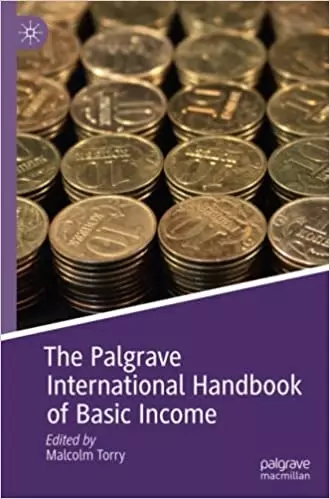The Palgrave International Handbook of Basic Income:
Malcolm Torry
"The Palgrave International Handbook of Basic Income (Exploring the Basic Income Guarantee)", Malcolm Torry
This is a useful, widely read reference for students, advocates and practitioners in the basic income movement. Its opening discussion of the definition of basic income lays a necessary foundation, is lengthy, repeated in the closing chapter, yet incomplete. A more enthusiastic inspiring introduction of the case for basic income would aid a good read. ‘Cash’ usually means notes and coins, but should specifically include bank payments. Discussion of the case for basic income always needs to clarify whether the proposal is additional to current income, or a replacement for other welfare benefits, as the case as replacement income is specific and limited to removal of intrusion, conditionality and employment and poverty traps, important though these are.
The following history section is of background interest, but focuses on the BIEN movement, paying less attention to more recent movements such as UBI Labs, the US Income Movement’s Basic Income March, and the UBI Advocates network. An opening phrase decries the ‘vanity’ of newcomers to the movement (page ix), whereas it may be these newcomers who have achieved greater public and political engagement. All movements suffer from the internal competition, and the basic income movement is no exception.
Chapter 4 sets out the complex network of factors relating employment to basic income. Automation may cause unemployment, requiring basic income. Basic income might reduce labour supply, but empirical evidence demonstrates only low effects. Chapter 5 addresses social effects, is repetitive, heavily dependent on Birnbaum (2012), and argues that UBI will remove the stigma from disability, though acknowledging that conditionality will still apply to extra disability benefits.
Chapter 6 points out that ‘poverty traps…are not necessarily extinguished by unconditional incomes’ (p94). The detail of UBI schemes is key to avoiding poverty traps which could also be addressed by more shallow tapers in targeted benefits. Chapter 7 examines how UBI could break the ‘productivist and growth-based paradigm’ (p112), to achieve the ecological benefit, but does point out that a carbon tax should eliminate fossil fuel use, not fund UBI (p122). Chapters 8-11 cover gender effects, feasibility and implementation, funding methods including wealth taxes and money creation, and microsimulations of income redistribution from UBI schemes. Chapter 12 discusses alternatives to UBI, such as universal basic services, job guarantee, negative income tax, and working tax credit, but omits discussion of improved targeted benefits schemes with lower withdrawal tapers and less conditionality. Chapter 13 points out that the framing of the UBI argument differs between academia and media, the latter emphasising the argument from automation.
Part IV on pilot projects is a very useful reference guide, covering projects and proposals in the US, Brazil, Iran, Namibia, India, Finland, Holland, Serbia, South Korea, Barcelona, Scotland and Switzerland. Only Iran is a true national UBI scheme, but inflation has eroded it to insignificant levels, and targeted benefits are now preferred. Brazil’s Bolsa Familia is small and neither universal nor conditional. The Namibian pilot evaluation is challenged for its methodology. The Indian project appears to report positively against a range of criteria. Finland’s pilot was a small sample, conditional, and reported an increase in well-being with little effect on labour supply. There are currently over 100 mayoral pilot projects in the US.
An overall analytical critique of pilots would help. By definition, pilots cannot test a universal, unconditional proposal (p531). Either we already know the effects of higher income on well-being, or we can conduct more immediate research strategies, such as cross-sectional analysis. It’s not always clear what the research objectives of basic income pilots are, nor how robust the methodologies are to derive policy conclusions. Better prior pathways are needed to morph from pilots to full implementation – none of the pilots have led to full implementation. Pilots cannot test important macroeconomic consequences of UBI. They do hugely raise public awareness but are in danger of driving that awareness into the long grass, as they take several years to conclude.
Chapters 14, 22-24, and 26 discuss libertarian, socialist, political and ethical philosophies for UBI. Basic income respects and enhances individual freedom. Chapter 25 suggests that UBI could be twinned with Job Guarantee to engage trade union support, but this argues against the evidence that automation is making less highly paid jobs available. In chapter 27, the editor argues that institutions such as CBIT and BIEN are superior for UBI advocacy to the short-term engagement of think tanks, conferences, articles, videos, and websites, but doesn’t present evidence to sustain this view. BIEN has little public engagement beyond its helpful annual conference, largely for activists, advocates, and academics.
What’s missing is a consideration of UBI’s interaction with the wider economy. Income supposes consumption, and in turn production. Income is ultimately funded by production, so the interaction of basic income proposals with the productive economy needs recognising and exploration.
The handbook is highly priced at £159.99, although this is now discounted to £41.44 on Amazon. Dissemination might be wider if BIEN published the book on its website for free download.
The book is available here.
Geoff Crocker
Editor ‘The Case for Universal Basic Income'
www.ubi.org

